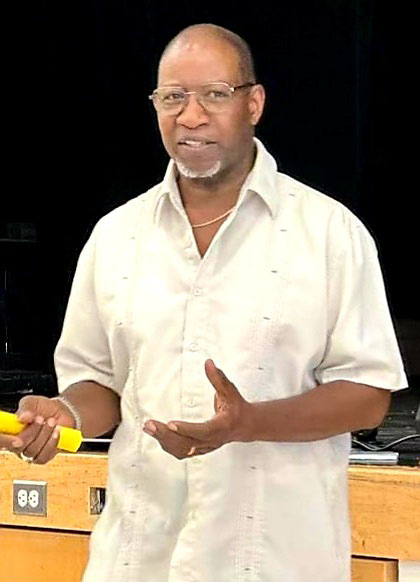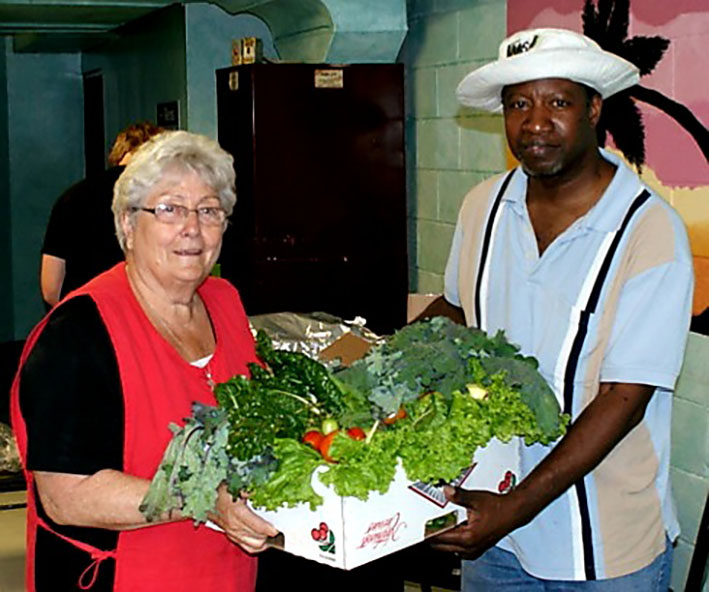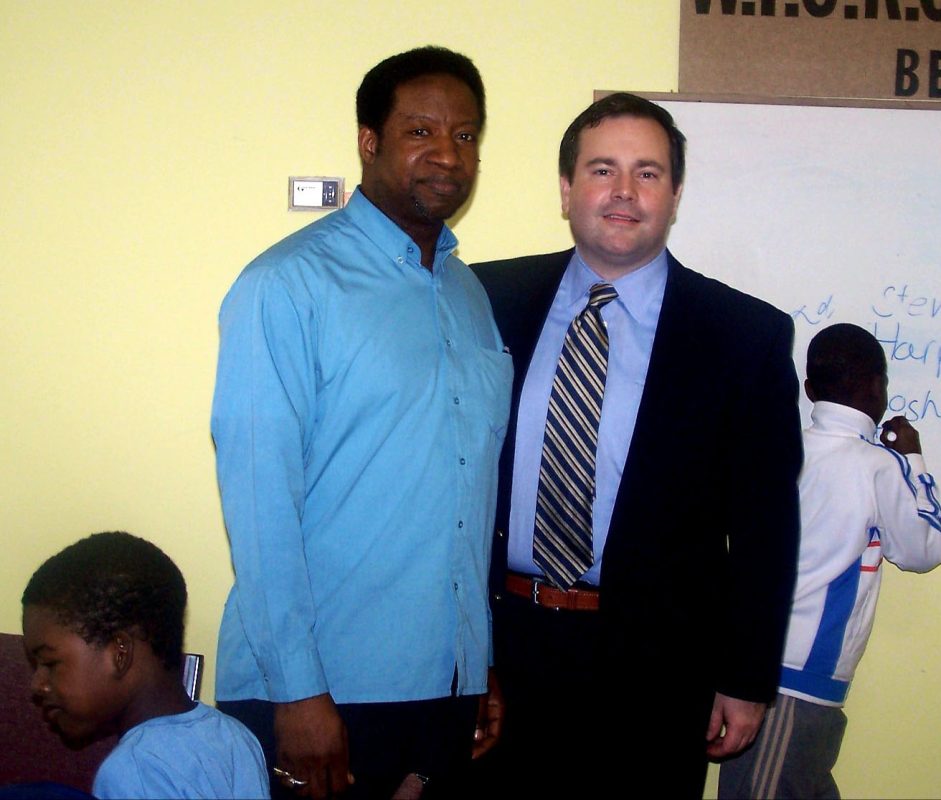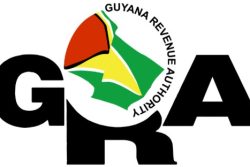Retired agricultural scientist Guyanese Dr Reginald Thompson has moved from research and the formal classroom to mentoring and guiding students to become the best version of themselves on weekends in the Durham Education Mentoring Programme (DEMP) in Ontario, Canada.
“We’ve thought of replicating this programme in Guyana. The issue is that we have to get people to see it as participating as a way of giving back and not looking for payment. You have to give up some free time to volunteer. In our mentoring programme, we occasionally give an honorarium to some people who work for us but it is not something we do continuously because we have to get money to cover all those things. We are not always able to ‘pay’ volunteers,” Thompson told Stabroek Weekend in a recent interview from his home in Oshawa, Ontario, Canada.
“I’m retired now but I have been very active in the mentoring programme where we run academic tutoring classes for students…, particularly for students in the Pickering/Ajax area and where I live, but we draw students from as far as Oshawa and the Toronto area [and]… the Toronto and Peel region.”
Thompson, who has been the president of DEMP for the past 15 years said the organisation, which is made up of retired and active professionals, tutors students from Grades 1 to 12 mainly in the areas of the English language and the sciences on Saturdays.
“We try to guide the older students in their career choices. This is done free of cost by the tutors. We seek sponsorship from various organisations including the government to keep us afloat. It is a volunteer organisation,” he said. A science educator and a former member of the New York Academy of Sciences, Thompson is an entomologist by training, a profession in which he practised for many years before turning to teaching. He said the transition from the office and field to the classroom was not a challenge.
“I was teaching in Guyana. Even though I taught at the Guyana School of Agriculture (GSA) before I came up to do my bachelor’s degree at Iowa State University where I did a double major in plant pathology and pest management, I had little patience. I was not quite the most patient person. I discovered I had more patience than I originally thought I had when I was doing extension work in Region One – Barima/Waini and when I got into research for the Central Agricultural Station, now NAREI [National Agricultural Research and Extension Institute]. Extension education is more like adult education. Extension work is sharing knowledge and I always liked sharing knowledge. So I have been sharing knowledge through the formal education system, through extension and the informal systems,” he said.
In Ontario, he taught at Middlefield Collegiate Institute in Markham in the York region, which he described as one of the best schools in Ontario.
“I might sound biased. It might not have had the best academic performances among students in the province but it was a joy to teach at an institution where there were very little behavioural problems among students,” he stated. Every school has problems with gangs, drugs, or those kinds of things but it was never a serious issue to take down our school. It became a predominantly Tamil school enrolled mainly by Tamil Sri Lankans whose parents or fore parents came in large numbers as refugees in the 1980s, other South Asians, a large group of Chinese, Caucasians and some Caribbean students in the minority. We had a large number of international students but that number declined after Covid-19.”
At Markham Collegiate, he said, “Students were keen on learning and were serious about education. I’ve had many students who have gone on to do their masters or PhDs in education, engineering degrees and in whatever else. I really enjoyed teaching and I continue to enjoy being a mentor. I have had great students.”
The past student of Queen’s College (QC) who is now looking forward to the premier secondary school’s 180th anniversary since its founding said that foremost in his learning at QC was definitely, “discipline” and to focus on being the best that he could be in every aspect of his life.
“I had some great influencers as educators whose style I tried to incorporate into my teaching. Dr Robert ‘Bobby’ Moore, former high commissioner to Canada and long-time history teacher was one of those who had a great influence on my style of teaching.”
Background
Born in Triumph, East Coast Demerara, Thompson in his early childhood lived in various parts of Guyana with his parents.
His father, then a public health inspector, moved around the country, to carry out his duties. The family lived in various places including Grove, Christianburg and Mahaica. After the family started growing and needed some stability, they lived initially in Wortmanville then settled in Lodge, Georgetown.
“My father kept on travelling until he retired but spent the weekends with the family in Georgetown,” he said.
Thompson attended the then Smith’s Memorial Primary School where he secured a place at QC after writing the common entrance examinations. After QC, he worked briefly in the public service and then went to the Guyana School of Agriculture where he did a two-year programme in agriculture and graduated in 1975. After graduating he stayed on at GSA for a year but as an instructor.
“The GSA’s influence on my life was very great,” he noted. “I moved into agriculture because it was something I wanted to do since in high school. I wanted to do scientific research since I was in fourth form. There was that great need to move agriculture forward in Guyana at the time, so I was inspired. I told myself that was where I wanted to go. I’d believed in one of my instructors Kenneth Croal who had impressed me into wanting to do entomology.”
He continued, “Later on. people at GSA who were either my instructors, tutors and mentors became my colleagues. When I started to work some were working at the Central Agricultural Station. When I went over to the Central Agricultural Station, Harry Bhajansingh, who was my instructor at GSA in microbiology, was the principal research officer at Mon Repos. When I went to NAREI he was the head of the MARDS [Mahaica Abary Rice Development Scheme] unit in Lower Mahaicony. Having been exposed to those people, it helped me to develop as a professional. I got to see these guys both as mentors and then as colleagues.”
After graduating from GSA, Thompson was also active in the early formation of the Alumni Association of the Guyana School of Agriculture which was founded in the mid-1970s. “The then principal Winslow Davidson had donated $100 for the start of the organisation. When I left to do my undergraduate studies, I can’t say what happened but I am glad that it has since been resuscitated. One has to understand there was a lot of economic pressure at the time. Also most graduates were younger and not really as focused,” he added.
Past students of the GSA are holding a reunion in late July/early August this year and Thompson is a major planner of that reunion.
Firsts
While at GSA, Thompson obtained a scholarship to Iowa State University, Iowa, USA, where he did a double major in plant pathology and pest management over a three-year period.
“I would have been the first Guyanese to hold a pest management degree,” he said.
He went into plant pathology on the encouragement of John Browman because there was a dearth of people in pathology in Guyana at the time. The late Dr Gordon Mueller, who taught him plant pathology at GSA and who had attended the University of Illinois, was another source of encouragement.
“That was how I went to Iowa State University and how I ended up in the Midwest in the US,” he added.
At Iowa State, he said: “We had pioneered the programme of pest management. I was one of the first set of students graduating from that programme. Pest management was only offered at the bachelor’s degree level around the time I got there.”
On his return to Guyana, he was assigned to the Ministry of Agriculture at the Central Agricultural Station, Mon Repos where he was the agricultural officer with responsibility for crop protection.
Shortly after that appointment he was seconded to the agricultural extension department in Mabaruma in the North West District.
“I was there in the North West when the government introduced the regional system as part of local governance in 1980. I functioned for a year as the regional agricultural officer for Region One, which covered the Matarkai, Mabaruma and Moruca sub-regions until a substantive officer was appointed. I gained a lot of experience and exposure working in that part of Guyana’s interior,” he said.
After returning to the Central Agricultural Station, he was involved in crop protection research that entailed some extension activities. He worked along the East Coast Demerara and West Coast Demerara and in areas of Mahaica, Mahaicony and Abary.
“Other than that I was mostly involved in working in the Black Bush Polder to deal with the pest, the diamondback moth of cabbage, that was serious in that area. We were trying to reduce the use of pesticides and that was my research area. We were looking at a pest management strategy to reduce the use of pesticides and to use intercropping with other crops to come up with other methods of pest control,” he said.
He did that until 1985 when the Central Agricultural Station was reincorporated into NAREI after which he was transferred to MARDS in Lower Mahaicony. MARDS became a part of the NAREI research stations and his focus was on rice.
“I shifted my research to pest resistant rice varieties. The problems we have now are the same as we had 40 years ago. We were looking for resistant varieties because the pesticide being used, monocrotophos, which I hope is no longer in use, was very toxic. The idea was to look for alternatives to control the paddy bug. From what I was reading recently, they are still looking for alternatives. The paddy bug is one of the major damaging problems to the rice industry at the moment. The damage to the grain caused by the paddy bug reduces the quality and the quantity of the rice and it is a serious economic loss,” he said
During this period, too, Thompson was involved with the Society of Professional Agriculturalists of Guyana started by Vibert Parvatan and John Piggott in 1971. He served as secretary and as president in 1984 and 1985 and during which time the society hosted two local and regional agricultural conferences, other educational activities and did fundraising. After he left the country to pursue his master’s and doctoral degrees, he said, he could not speak for the society. “Like I said, it takes a few dedicated people to do the work. An association is only as strong as its membership. We didn’t have a paid membership and a lot of people migrated,” he noted.
Teaching
Thompson returned to the US to read for his master’s and doctoral degrees in entomology at Louisiana State University (LSU) between the years 1989 and 1993. His master’s focused on looking at the relationship between pesticide and intercropping while his PhD was on finding alternatives to using pesticides. While at LSU, he worked with the Louisiana Agricultural Center as a research assistant. He spent some years in Louisiana and then moved to New York where his career trajectory changed.
Instead of continuing agricultural research, Thompson taught in New York and decided to pursue a bachelor’s degree in education at New York University.
“Then I migrated to Ontario, Canada. I didn’t continue my agricultural pursuits anymore, except for my little gardening. Instead I pursued an education career teaching the sciences in the high schools from Grades 9 to 12,” he said.
When he moved to New York, his focus before was in agriculture specialising in rice and the research opportunities for grain, mainly wheat, were mainly out west of the US and in Canada.
Apart from that, the opportunities for teaching at the University of Guelph, in Ontario, which specialises in agriculture were not there. “It wasn’t easy to move around at the time because of family and so on. At a certain age it wasn’t that easy to start all over again,” he added.












